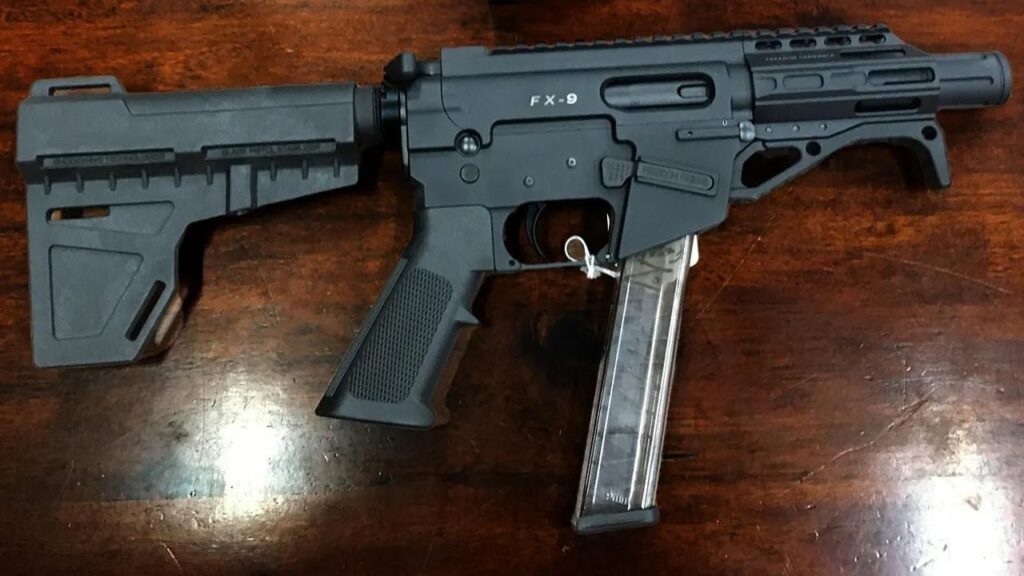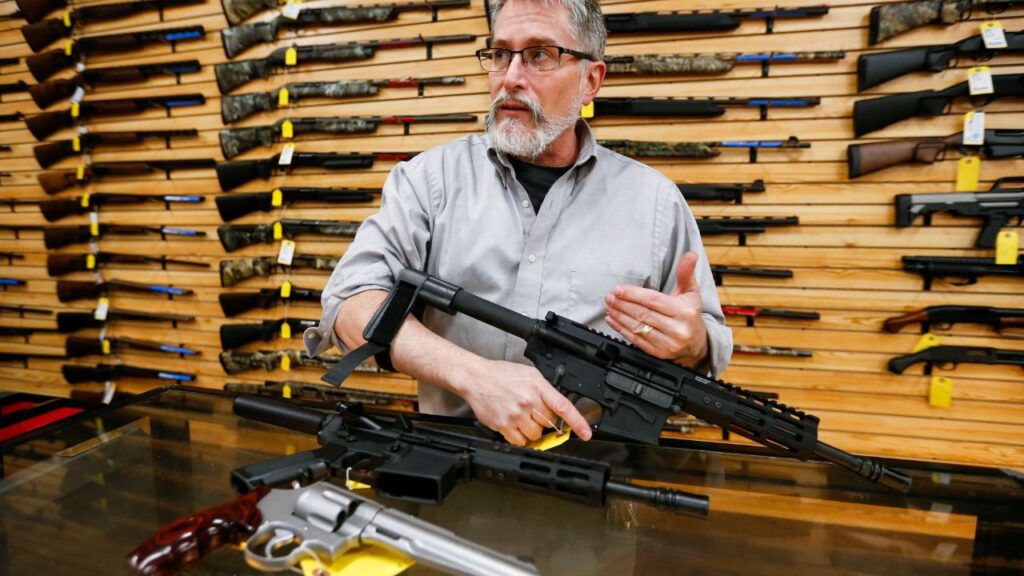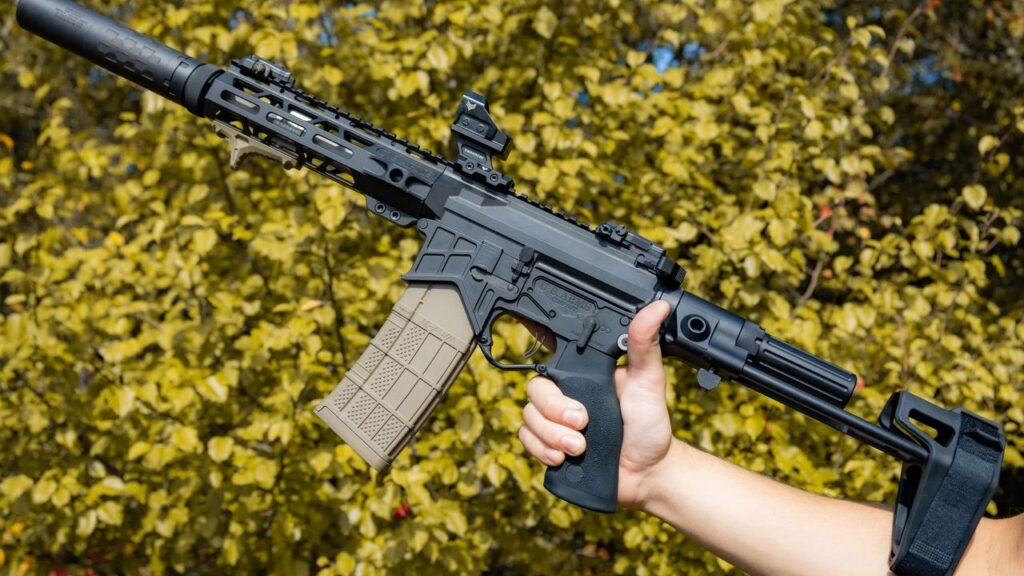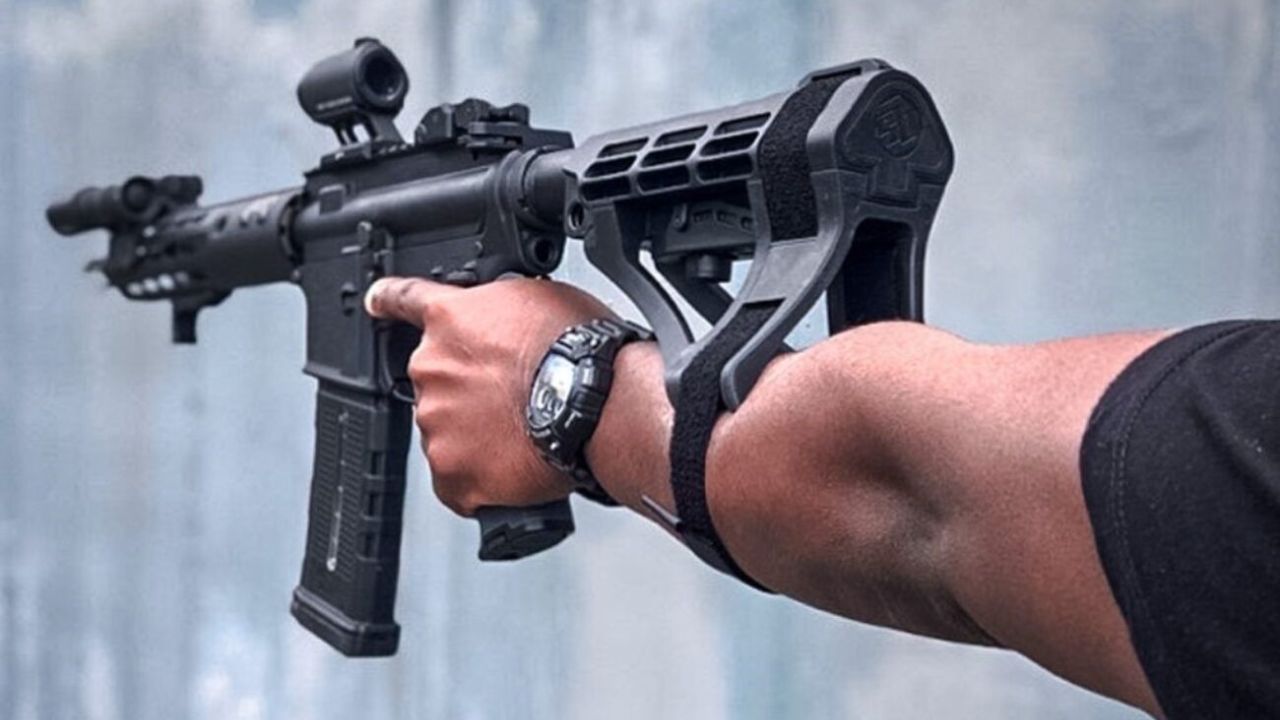Are Pistol Braces Illegal In Texas? Pistol braces are not illegal in Texas; however, their legality is impacted by federal regulations.
Pistol braces have sparked significant debate among firearm enthusiasts, lawmakers, and regulatory bodies.
Originally designed to assist disabled shooters by providing extra stability, these accessories have become increasingly popular among gun owners for their ability to enhance control and accuracy without the need for a full rifle setup.
However, the legal landscape around pistol braces has become more complex, especially with recent federal regulations that affect their classification.
In Texas, known for its pro-gun culture and relatively relaxed firearm laws, understanding the legal status of pistol braces is crucial for gun owners to avoid potential legal trouble.
This blog post explores whether pistol braces are illegal in Texas and provides a comprehensive overview of the steps Texas gun owners must take to stay compliant with both state and federal laws.
Contents
- 1 What Are Pistol Braces?
- 2 Federal Laws Impacting Pistol Braces
- 3 Are Pistol Braces Legal in Texas?
- 4 Consequences of Non-Compliance
- 5 What Should Texas Gun Owners Do?
- 6 FAQs
- 6.1 What is a pistol brace, and why is it controversial?
- 6.2 How does the new ATF rule affect pistol braces in Texas?
- 6.3 Do I need to register my pistol brace-equipped firearm in Texas?
- 6.4 Are there any exemptions to the new federal regulations?
- 6.5 What are the penalties for not complying with the ATF’s new rule?
- 7 Final Verdict
- 8 Conclusion: Are Pistol Braces Illegal In Texas?
What Are Pistol Braces?
Definition and Purpose
A pistol brace, also known as a stabilizing brace, is an accessory attached to the rear of a firearm, designed to wrap around the user’s forearm.
The main purpose of a pistol brace is to provide extra stability and control when firing a handgun, especially for disabled shooters. [Are Pistol Braces Illegal In Texas?]
Unlike a traditional rifle stock, a pistol brace does not convert the firearm into a shoulder-fired weapon, which is a key distinction in firearm classification.
History and Development
The concept of the pistol brace was introduced in 2012 by SB Tactical, with the intention of helping disabled veterans more comfortably and accurately fire AR pistols.
The idea quickly gained traction among the broader gun-owning community, who found that the brace offered greater control without turning their pistols into rifles, which would subject them to more stringent regulations under the National Firearms Act (NFA).
Over the years, pistol braces have evolved in design and functionality, with numerous variations becoming available on the market.
Usage and Popularity
Pistol braces are particularly popular among owners of AR-15 pistols and other similar firearms, allowing them to improve accuracy without the added length and weight of a rifle stock.
This accessory has become a favorite among gun enthusiasts who prefer the maneuverability of a pistol with some of the benefits of a rifle.
However, the growing popularity of pistol braces has also drawn the attention of regulatory bodies, leading to the current legal debates.

Federal Laws Impacting Pistol Braces
ATF’s New Rule (2024 Update)
The Bureau of Alcohol, Tobacco, Firearms, and Explosives (ATF) has played a central role in the evolving legal status of pistol braces. [Are Pistol Braces Illegal In Texas?]
In 2024, the ATF introduced a new rule that significantly impacts the legality of pistol braces across the United States, including in Texas. According to the ATF, certain firearms equipped with pistol braces are now considered short-barreled rifles (SBRs) under the National Firearms Act (NFA).
This reclassification requires gun owners to register their brace-equipped firearms as SBRs, undergo a background check, and pay a $200 tax stamp. This has created considerable confusion and concern among gun owners who must navigate these complex regulations.
National Firearms Act (NFA) Compliance
The NFA, enacted in 1934, imposes strict regulations on firearms classified as SBRs, among other categories. An SBR is defined as a rifle with a barrel length of less than 16 inches or an overall length of less than 26 inches.
The ATF’s new rule expands this definition to include many firearms equipped with pistol braces, thereby subjecting them to the NFA’s registration requirements.
Gun owners must either register their firearms as SBRs, remove the brace, or otherwise modify the firearm to avoid falling under the NFA’s purview.
Registration Requirements
The ATF has provided a grace period for gun owners to comply with the new regulations. This period allows owners to register their brace-equipped firearms without paying the usual $200 tax stamp fee.
However, once the grace period expires, non-compliance could result in severe penalties, including fines and potential jail time. [Are Pistol Braces Illegal In Texas?]
For gun owners in Texas, understanding these federal requirements is essential, as state laws alone do not provide immunity from federal regulations.
Controversies and Legal Challenges
The ATF’s reclassification of pistol braces has sparked significant controversy and legal challenges. Many gun rights advocates argue that the rule is an overreach of federal authority and a violation of the Second Amendment.
Several lawsuits have been filed against the ATF, challenging the legality and constitutionality of the new rule.
These ongoing legal battles create additional uncertainty for gun owners who must decide whether to comply with the rule, challenge it in court, or wait for further developments.

Are Pistol Braces Legal in Texas?
State Law Perspective
Texas is known for its strong support of the Second Amendment and its relatively permissive stance on gun ownership.
Under Texas state law, there are no specific bans or restrictions on the possession, use, or purchase of pistol braces. [Are Pistol Braces Illegal In Texas?]
As such, Texans can legally own and use pistol braces without any unique restrictions imposed by state law. However, the situation becomes more complicated when considering federal regulations.
Federal vs. State Jurisdiction
While Texas has a pro-gun legal environment, it is essential to recognize that federal laws take precedence over state laws when it comes to firearm regulations. The ATF’s new rule on pistol braces applies nationwide, including in Texas.
This means that even though Texas does not have any state laws prohibiting pistol braces, the federal reclassification of certain brace-equipped firearms as SBRs still applies to Texas residents.
Therefore, Texas gun owners must comply with both state and federal laws to avoid legal complications.
Current Legal Status in Texas
As of now, pistol braces are legal in Texas under state law. However, the federal regulations introduced by the ATF mean that firearms equipped with pistol braces may be classified as SBRs, subject to NFA requirements.
This dual-layered legal framework creates a situation where Texans must ensure they are compliant with both sets of regulations.

Consequences of Non-Compliance
Penalties Under Federal Law
Failure to comply with the ATF’s new rule can result in significant legal repercussions for Texas gun owners. [Are Pistol Braces Illegal In Texas?]
Penalties for non-compliance under federal law include hefty fines, confiscation of the firearm, and potential criminal charges, which could lead to imprisonment.
The severity of these penalties underscores the importance of understanding and adhering to federal firearm regulations.
Impact on Gun Owners in Texas
The new federal regulations have a direct impact on Texas gun owners, who must navigate a complex legal landscape.
Despite Texas’s permissive stance on gun ownership, the ATF’s ruling changes the classification of certain firearms, and residents must take appropriate steps to ensure they do not inadvertently violate federal law.
This situation has led to confusion and frustration among gun owners, many of whom feel caught between conflicting state and federal rules.
What Should Texas Gun Owners Do?
Options for Compliance
To comply with the ATF’s new rule, Texas gun owners have several options. [Are Pistol Braces Illegal In Texas?]
These include registering their brace-equipped firearms as SBRs under the NFA, modifying their firearms to remove the brace or configure them in a way that avoids SBR classification, or potentially replacing the brace with a non-regulated accessory.
Each option comes with its own set of requirements and implications, and owners must carefully consider which path is best for them.
Registration and Modification
Registering a firearm as an SBR involves submitting an application to the ATF, undergoing a background check, and paying a $200 tax stamp fee.
However, the ATF has offered a temporary waiver of the tax stamp fee for those who register within the grace period. [Are Pistol Braces Illegal In Texas?]
Alternatively, owners can remove the pistol brace from their firearm, ensuring it does not meet the criteria for an SBR. This may involve additional modifications to comply with federal regulations.
Seeking Legal Advice
Given the complexities involved in navigating these new regulations, it is highly advisable for gun owners to consult with a legal expert who specializes in firearms law.
A knowledgeable attorney can provide specific guidance tailored to individual cases, help understand the nuances of both state and federal laws, and ensure full compliance to avoid any legal pitfalls.
Impact on Gun Culture in Texas
The federal regulation on pistol braces has broader implications for the gun culture in Texas.
With a long history of gun ownership and a strong pro-gun stance, many Texans view these federal regulations as an infringement on their rights.
The new rule has sparked debates about federal overreach, the Second Amendment, and the balance of power between state and federal governments.
These discussions are likely to continue as legal challenges to the ATF’s rule make their way through the courts.
See Also: Is Underglow Illegal In Texas? Texas Drivers Beware!
FAQs
What is a pistol brace, and why is it controversial?
A pistol brace is an accessory designed to stabilize a pistol by strapping to the forearm. It turned disputable after the ATF categorized numerous brace-provided handguns as short-barreled rifles (SBRs), which ensures stricter regulations under the National Firearms Act (NFA).
How does the new ATF rule affect pistol braces in Texas?
The ATF’s new rule applies nationwide, including in Texas, requiring pistol braces to be registered as part of SBRs if they meet the criteria, even though Texas state law is more permissive regarding gun ownership.
Do I need to register my pistol brace-equipped firearm in Texas?
Yes, under federal law, if your firearm with a pistol brace meets the criteria of an SBR as defined by the ATF, you must register it under the NFA, regardless of Texas state laws.
Are there any exemptions to the new federal regulations?
Certain exemptions may apply for specific types of braces or configurations, but these are limited and require thorough legal analysis to determine eligibility. Consulting with a legal expert is recommended for accurate guidance.
What are the penalties for not complying with the ATF’s new rule?
Penalties for non-compliance can include fines, confiscation of the firearm, and criminal charges that could result in imprisonment. It is crucial for gun owners to take the new regulations seriously and seek legal compliance.
Final Verdict
While pistol braces are not illegal in Texas according to state law, the recent federal regulations issued by the ATF significantly impact their legality.
Texas gun owners need to navigate both state and federal laws carefully to avoid serious legal consequences. [Are Pistol Braces Illegal In Texas?]
Given the potential penalties and ongoing legal battles over the rule’s validity, it is vital for gun owners to stay informed, consult with legal experts, and take the necessary steps to remain compliant with both state and federal requirements.
Conclusion: Are Pistol Braces Illegal In Texas?
Understanding the legal complexities surrounding pistol braces is essential for firearm owners in Texas. With new federal regulations now in effect, Texans must stay updated on both state and federal laws to ensure compliance.
By taking proactive steps, such as registering firearms, consulting legal professionals, and staying informed about ongoing legal challenges, gun owners can navigate these uncertain waters safely and responsibly.
The debate over pistol braces is likely to continue, but what remains clear is the need for vigilance and adherence to the law. [Are Pistol Braces Illegal In Texas?]
This comprehensive guide should help clarify the current legal status of pistol braces in Texas and provide valuable insights into what steps gun owners should take to remain compliant.

Hello guys, I’m Trey Simpson from Los Angeles. After completing my J.D., I noticed a lack of clear information online about laws in different U.S. states. So, I created this blog to help. Now, I’m a lawyer and continue blogging. Thanks for visiting!

